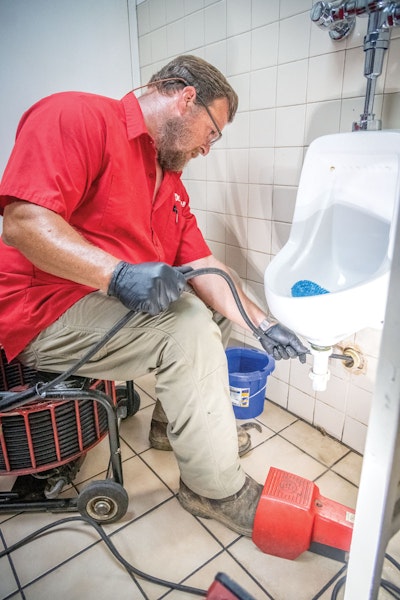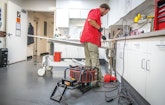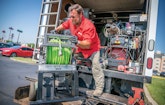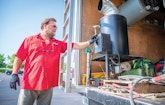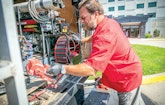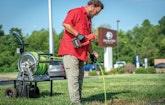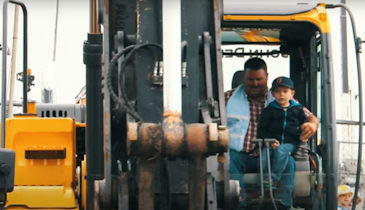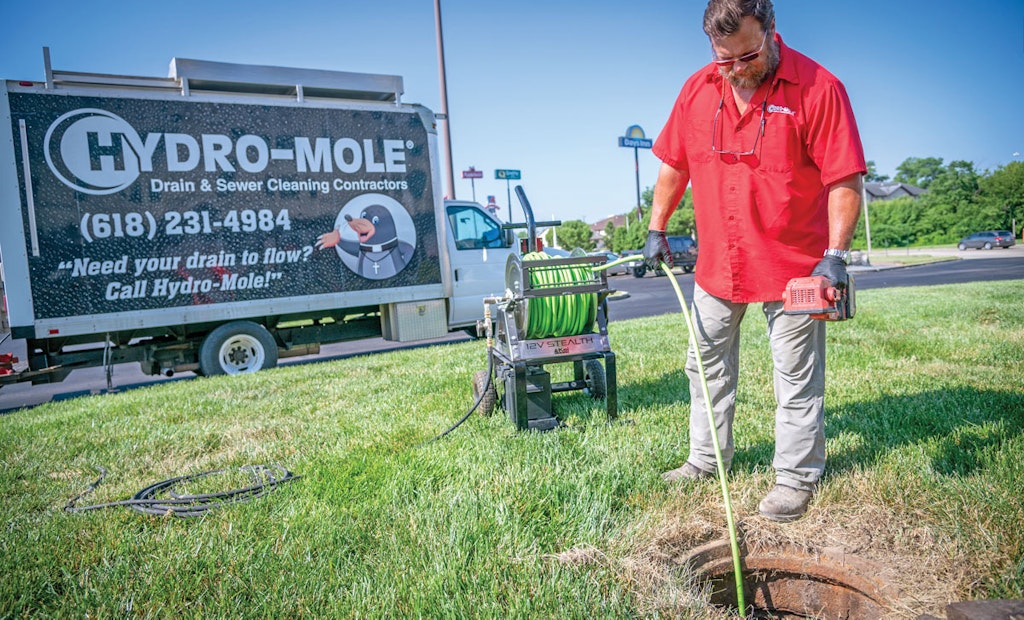
Rodney King, owner of Hydro-Mole, removes grease from a line coming out of a kitchen at the DoubleTree Inn and Suites in Mount Vernon, Illinois.
Interested in Cleaning?
Get Cleaning articles, news and videos right in your inbox! Sign up now.
Cleaning + Get AlertsSome successful companies spring full-blown from the mind of a founder. All contingencies planned for. Five- and 10-year goals firmly in place. Every box checked. Success, here we come.
Other companies just sort of happen. They segue from startups to seriously successful enterprises by taking risks and riding opportunities. That’s the story of Hydro-Mole Drain and Sewer Cleaning Contractors and its owner Rodney King.
King, 56, was a police officer for 10 years in his native Mount Vernon, Illinois. In about the eighth year of his law enforcement career, he decided to also start a pressure-washing business on the side. Being self-employed was a family trait, and the entrepreneurial gene hadn’t skipped a generation. King bought a Honda pressure washer and went to work cleaning concrete surfaces part time in banks and fast-food drive-thrus as well as in other locations.
The next step in his serendipitous business plan occurred the very next year when he spotted a Walmart service technician in the store’s parking lot. He idly inquired if Walmart might have some pressure-cleaning work that he could do. It turned out that Walmart hired contractors to clean air conditioning coils in rooftop units.
“I was at the right place at the right time,” King says.
Walmart management was not satisfied with the work of the company then holding the contract and encouraged King to bid on the work. He did, won the contract and soon had two guys in two trucks cleaning AC coils in all the Walmart and Sam’s Club stores in southern Illinois and southern Indiana.
King kept his day job on the police force, though he helped his workers from time to time. The following year, Walmart executives expressed complete satisfaction with the pressure cleaning work and gave King a contract for all of the corporation’s Illinois and Indiana facilities.
“In 1999, I quit the police department and concentrated on my business,” King says. “A contract was just for a year, so I was gambling that I could keep it.”
The gamble paid off. Over the next 11 years, King’s pressure washing business with Walmart grew until he had six guys in three trucks cleaning stores in about a dozen states from Virginia to Montana. The workload increased further when Walmart contracted him to clean refrigeration racks in addition to the AC units.
Making the move to drain cleaning
King kept thinking about how he could evolve his business. He diversified and began to dabble in drain and sewer work while he was still fully engaged with Walmart. Then, in 2010, King ended his work with Walmart entirely and the following year launched Hydro-Mole Drain and Sewer Cleaning Contractors.
Furthermore, he adapted to pipe cleaning the same pressure-washing equipment he had so effectively used on Walmart rooftops.
“All that equipment I had for Walmart transferred over,” he says. “I didn’t have to go out and buy a jetter.”
Instead, King calls on his two Honda pressure-washing units, each of which produces 8 gpm at 3,000 psi. If one can’t unclog a line, he brings both units to tackle a blockage. That proves sufficient for the lines he works on, mostly ranging from 2 inches to 8 inches in diameter.
But the transition to full-time pipe cleaning wasn’t without some difficulty for King.
“Starting a new business is hard,” he says. “Some plumbers referred jobs to me, some didn’t. I had to work to get the business off the ground.”
For three years he hedged by bidding and winning some more pressure cleaning contracts with Walmart, but he persisted.
“Then the business really started taking off,” King says.
Solo operation
Today, King answers drain and sewer service calls all across southern Illinois, from Effingham to Cairo. Three quarters of his customers are homeowners and property owners. The rest are split between industrial and commercial.
“I do it all,” King says. “I might work at cleaning culverts for a township one day, then answer a call from the local Continental Tire factory.”
He says he likes the mix.
“It is different every day,” King says. “One day you have nothing particular going and then the next you’re called to a food processing plant. I’m blessed with the work that people give me.”
Though the workload of Hydro-Mole has increased, the number of people doing the work has not. King works alone.
“It’s just me,” he says. “There are times when I wish I had a helper. It would be nice to have someone else setting up when I get to a job. But I have a lot of plumbing buddies, and most of the time if I really need someone to help, I can get someone. I can do it myself 95% of the time.”
Because King works alone, that means some customers call when he’s already obligated to another job. He can’t be in two places at once.
“Most of the time, they’ll wait. They know I’ll get to them,” he says.
That suggests Hydro-Mole Drain and Sewer enjoys a good reputation and also might reflect the prices King charges for his services.
“Not having employees helps me keep prices at an affordable level,” King says. “I don’t have any extra overhead. I can do a job for $125 an hour, and most of the time I’m done within an hour. Go 60 miles west to St. Louis and you’ll pay $700-800. This is southern Illinois. You need to keep prices affordable.”
Reliable tools
The use of pressure washing equipment to clear impediments from smaller-diameter drains and sewers made business sense because King could reutilize equipment he already owned. Otherwise, King’s tool selections and his approach to the work are pretty conventional.
He attends the WWETT Show in Indianapolis most years, usually searching for new nozzles.
“My main nozzles are from StoneAge, the Warthogs. The WT for 3/8-inch hoses; the WS for 1/2-inch hoses,” King says.
His Picote Mini Cleaner is a go-to tool when he is working narrower lines. He can also haul out a Spartan Model 300 cable machine or a sectional machine from Electric Eel. For pipe inspections, King relies on Envirosight and KeyVision units.
When a plug resists both pressure and cable, King fires up his Mi-T-M burner to heat up water to unleash against the clog.
Success stories
King has had notable success with his hot water solution. On one call from a plumber friend, a hospital had a thoroughly clogged 600-foot drainline that everyone assumed would have to be excavated and replaced.
“I started jetting with hot water and poked a hole through the grease,” King recalls. “Then I ran a camera in there — into a 6-inch PVC line connected to an 8-inch cast iron line — and found years of buildup in the cast iron. I got it cleared and now I go out there every quarter and jet the lines. It turned into a pretty good gig.”
On another occasion, a plumber called about a drain that served two adjacent houses.
“I went there and started jetting,” King says. “There was a chemical smell and I didn’t know what it was. Turns out the other house used to be a funeral home and the smell was formaldehyde that had built up in the line. Rock hard.”
King used a degreaser and his hot water to tear through the blockage.
One more hot-water story: A convenience store was being remodeled and at the end of the day the flooring crew flushed their excess epoxy down a toilet. It took King two days to clear the epoxy from the line, which served both men’s and women’s restrooms.
“I had my hot water and the WS nozzle and a flushing nozzle and I was able to start breaking it apart and pull it out of there,” he says.
The flooring company indirectly paid that bill.
A cleaning job not involving hot water instead involved distance. A coal mining company in southern Illinois called King because the mine’s water discharge line running to the surface became blocked when accumulated coal dust solidified inside. The company told King the line probably ran 500 feet down to the mine floor.
“At 520 feet it still wasn’t unblocked,” he says. “I kept adding 50-foot lengths to the 1/2-inch hose. At 720 feet, I finally broke through.”
Then things got interesting. Air pressure from the deep mine wouldn’t release its hold on the hose until King hooked it to a truck and pulled it out. The unorthodox retrieval method ruined all but the last 200 feet of hose. The company ended up buying King new hose.
“It was down there 720 feet,” King says. “That’s a long way. The St. Louis Gateway Arch is only 630 feet tall.”
A coal mine executive told King he was going to make a notation in his work file next to King’s name: “Expert.”
Keep on keeping on
One of the work habits King picked up in his Walmart pressure cleaning days was using polyurethane dikes to contain water runoff around air-conditioning units. When he switched to working in homes and restaurants, he continued the practice.
“Whenever you’re jetting, you have water coming back. You have to contain it. I use them whenever I’m working indoors. That backwash can be nasty.”
Needless to say, customers appreciate the care shown for their kitchen or bathroom floors, and that’s good for business.
“I enjoy helping people,” King says. “I’ve always been a people person. I like the position I am in in my life. I enjoy cleaning drains and sewers.”
And if all else fails, King can always return to Walmart, which still invites him to bid for new contracts. But he says he has no plans to send in any bids.
“I just want to keep doing what I’m doing, which is providing the best service at the best price,” King says.
